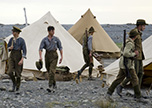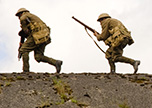« War News
Bloodsoaked Battlefields: The Horrors of the Somme
Description
Available to rent or download on Vimeo

A New Zealand soldier has been court-martialed for refusing to go into battle in this week’s episode of Prime’s groundbreaking docu-drama series War News. But, after witnessing the horrors of the Somme, should Corporal Bill Butler be in court or in a hospital?
Back home, Māori leaders debate conscription, anti-German sentiment is rising, and British commander General Sir Douglas Haig faces tough questions about his strategy and tactics on the Somme.
War News, a dramatised WWI current affairs show based on fact, was created by the Gibson Group with NZ On Air’s prestigious Platinum Fund. The series transports viewers to WWI by placing a TV current affairs team at the coalface of the war.
In this episode, correspondent Jack Crawford (Jason Whyte) reports from Le Transloy in northern France on the fictional 1916 court-martial of Corporal Bill Butler, a soldier in the New Zealand Division. Crawford takes a special interest in the case - he met Corporal Butler on Gallipoli and again while embedded with Butler's battalion on the Somme, which is shown in vivid flashbacks.
“Cowardice was one of the military’s most serious crimes, held on a par with desertion,” says War News writer David Brechin-Smith. “But what was often suspected as being ‘malingering’, or shirking of duty, was actually shell shock, which was only a newly recognised condition and poorly understood. Mental illness and war go hand in hand. With War News we could look at the issue in a contemporary way.”
The medical journal Lancet first published the term "shell shock" in 1915. As Corporal Butler’s legal counsel, Major Robert Trent (Paul McLaughlin) observes, “The vast majority of men are not professional soldiers. They’re civilians, and they’re being ordered to do things that in civilian life would be illegal, even immoral.”
Of the 28 New Zealand soldiers court-martialed during WWI most were accused of desertion. Five faced the firing squad. The others had their sentences commuted or quashed on review.
Back in New Zealand, conscription was now compulsory under the Military Service Act 1916, but not for Māori and there are questions within Māoridom about whether or not conscription should be extended to include Māori. In the studio, War News anchor Ray Harkness (Mark Mitchinson) debates the issue with two prominent Māori leaders.

Left: Maria Walker as Te Puea Herangi. Right: Taungaroa Emile as Maui Pomare.
Reform Party MP Maui Pomare (Taungaroa Emile) believes Māori should be subject to conscription in order to be seen as equals to Pākehā. But King movement leader Te Puea Herangi (Maria Walker) argues that Māori have no part in fighting the Empire's war, especially when the issue of confiscated tribal land remains unresolved.
“Tapping into Te Puea has been interesting,” says actor Maria Walker (Rage, Avatar). “She's very forthright, she’s educated and very independent. That’s historical for a woman at that time, let alone a Māori woman.”
Likewise, Taungaroa Emile (Once Were Warriors, Shortland Street, No.2) feels honoured to have portrayed Maui Pomare. “As a Te Aute College old boy I feel quite privileged, and quite possessive of anything that tells a story of an old boy from my old college.”
Also in this episode, Ray Harkness examines the rising anti-German sentiment in New Zealand. Writer David Brechin-Smith relished the chance to “illuminate a part of our history that is a bit darker, a bit nasty. There was more to New Zealand at that time than some people think. We're human, with prejudices, and we can be very quick to judge without getting the full story. To throw the spotlight on that was great.”
Harkness also puts tough questions to General Sir Douglas Haig (Tim Gordon), commander of the British Expeditionary Force. Nicknamed “The Butcher of the Somme” he has been accused of arrogantly sticking to a flawed strategy that resulted in hundreds of thousands of needless casualties.
Brechin-Smith found Haig’s story to be one of the more complicated writing tasks, and he sought the help of leading New Zealand war historian Dr. Damien Fenton, who had valuable input into all the scripts.
“Damien was great for bringing balance to the show, especially in terms of acknowledging that there were two sides, and that the generals weren't caricatures. Haig copped a lot of the blame for the Allied losses on the Somme. If you read some of his despatches and letters you sense that he had a lot of humanity, and that he cared for his troops. Haig comes across as very much a soldier’s soldier.”
As Haig himself tells Harkness: “If a man signs up and offers his life for his country, am I not to take him at his word?”
War News. Prime Sunday 29 June 2014









